The Department of Health has announced that a further five people who had been diagnosed with Covid-19 have died.
It brings the overall death toll here to 1,664.
The department has also been notified of an additional 38 cases of the virus, bringing the total number of cases here to 25,142.
The latest figures from the department show that of the 25,104 cases, as of midnight last Tuesday, over 3,311 cases - or 13% - have required hospitalisation.
Of these, 410 cases have been admitted to intensive care.
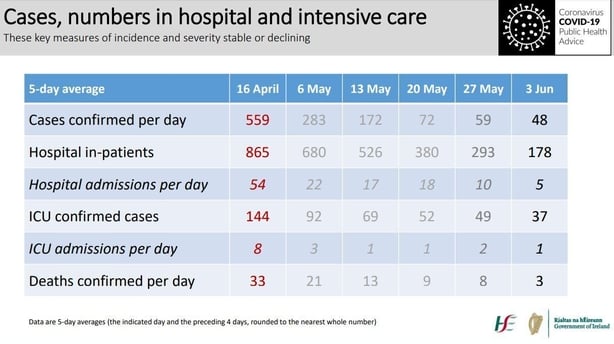
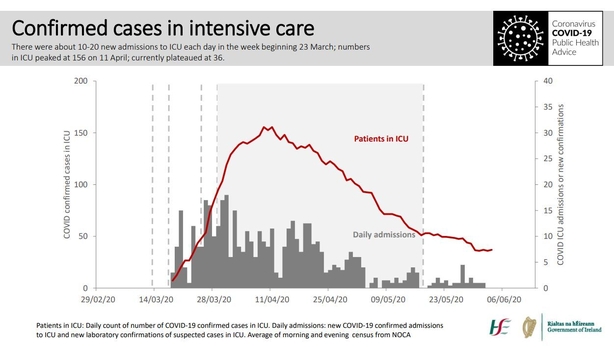
Over 8,025 cases have been associated with healthcare workers, accounting for around 32% of all cases.
The median age of cases so far is 48, with a split of 57% female, and 43% male.
Dublin has the highest number of cases with 12,109 (48% of all cases), followed by Cork and Kildare.
On compliance with #coronavirus restrictions, @CMOIreland says the public has generally "stayed with us", but house parties worry him, saying "house parties are being organised with abandon, it seems to me, as though we weren't in the midst of a pandemic". https://t.co/yro2bXPnFk pic.twitter.com/MfTIKNrCmJ
— RTÉ News (@rtenews) June 4, 2020
The figures come as Minister for Health Simon Harris told the Dáil that there has been a "slight potential increase" in the reproductive rate of the virus.
Mr Harris said the data suggests that the rate is now between 0.4 and 0.7.
However, he said the number still remains below 1, and that means the growth of the virus is still being suppressed.
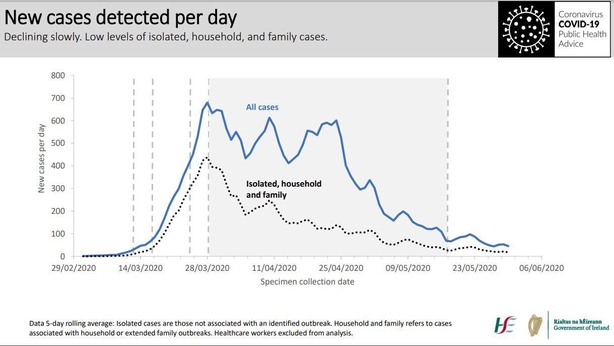
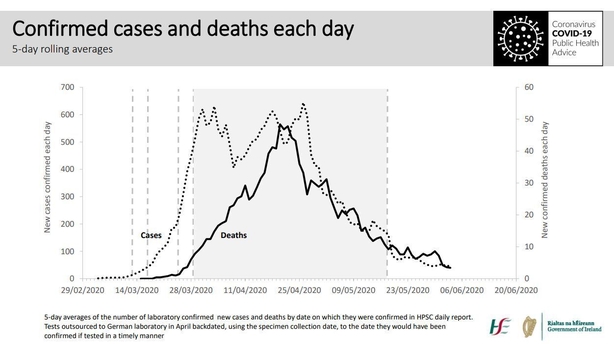
Speaking at this evening's briefing, Chief Medical Officer Dr Tony Holohan said further progress was made this month, and a downward trend was evident in the number of hospitalisations, ICU admission and reported deaths.
Dr Holohan said there remain some issues that give him cause for concern. He said, anecdotally, he is aware that house parties are being ''organised with abandon as though we weren't in the midst of a pandemic''.
''We are not yet at a point where house parties and gatherings indoors is appropriate,'' he said.
He said a lot of focus has been on gatherings outdoors on beaches, platforms and dart stations.
But he said it is the ''unseen activity in ordinary houses that we cannot recommend'.'
He said it is one example where public behaviour is getting ahead of the advice issued.
Professor Philip Nolan, Chair of the National Public Health Emergency Team Irish Epidemiological Modelling Advisory Group, said the easing of restrictions in Phase One has not negatively impacted the reproductive number.
Asked about gauging the R number when cases are low, Professor Philip Nolan, chair of the Irish Epidemiological Modelling Advisory Group for NPHET, says the emphasis at the moment has to be on the number of cases; "that's the most reassuring piece of news" at present. #Covid19 pic.twitter.com/qUGy2NP46S
— RTÉ News (@rtenews) June 4, 2020
Prof Nolan said the number of Covid-19 cases is lower this week compared to last week.
He said there are between a dozen to 20 new cases per day, and there is a slow decline in cases in all settings.
Prof Nolan said the numbers being admitted to hospitals have remained in single figures for two weeks.
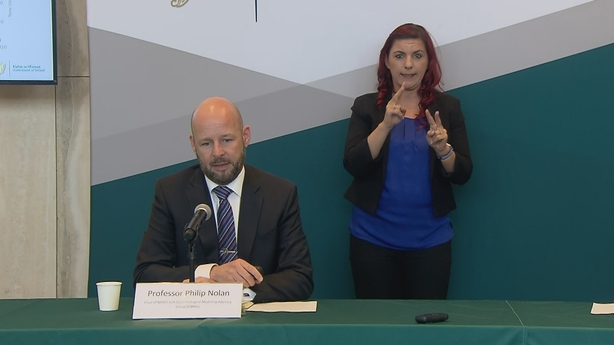
This week on average there are 48 new cases being confirmed every day compared to an average of 60 last week, with fewer than ten admissions to hospital every day.
There was an average of 37 admissions to ICU this week, with admissions to ICU per day down to 1.
Read more:
Pandemic Unemployment Payment to be extended for 'months, not weeks'
Major retail stores with own entrance to reopen from Monday
Live coronavirus updates as they happen
Latest coronavirus stories
We need your consent to load this rte-player contentWe use rte-player to manage extra content that can set cookies on your device and collect data about your activity. Please review their details and accept them to load the content.Manage Preferences
On the possibility of accelerating the roadmap, Dr Holohan said he is ''open to the possibility, where evidence and experience in other countries suggests we make changes, that we would make those changes.''
He said he would make that advice available to government for consideration.
Dr Holohan said he doesn't feel under pressure to accelerate the government road map, and reiterated any advice offered is on public health grounds.
Regarding air travel, he urged the public to listen to the Department of Health guidance on non-essential travel. He said it remains unchanged and the advice is against all non-essential travel. That advice includes any overseas travel and holidays abroad.
Dr Holohan also said there is still no requirement for mandatory wearing of face coverings here, however, he recommended people using public transport to wear face coverings.
He also said he does not see the road map as ''a rigid constitution'' but as a ''broad framework'' to base decisions on.
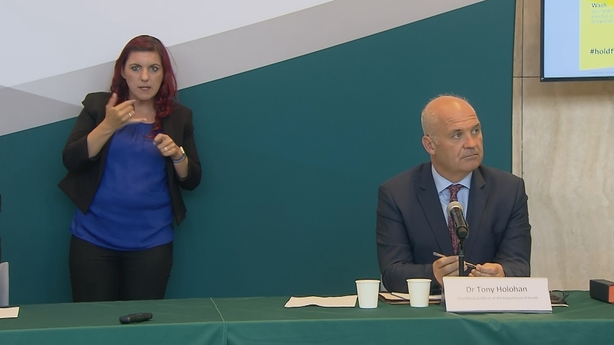
Meanwhile, the Cabinet is expected to grant approval for the reopening of major retail stores from next Monday when it meets tomorrow.
This approval will be subject to stores having an entrance on to a street.
This is ahead of schedule and tallies with comments from the Taoiseach earlier today that proposals have been put to National Public Health Emergency Team to ease some restrictions early.
The reopening of playgrounds is also set to be approved tomorrow.
People may also be allowed to visit hospitals, residential centres and prisons again.
Earlier Taoiseach Leo Varadkar said proposals have been made to NPHET and the Chief Medical Officer to bring forward the lifting of some Covid-19 restrictions.
He said the Government has proposed that elements of Phase Three of lifting of restrictions could be brought forward into Phase Two. He said this would be subject to Cabinet approval.
He added elements of Phase Four could be brought forward into Phase Three.
The Taoiseach also expressed concern that people were calling for the Government to accelerate the plan to reopen our economy and society.
Speaking in the Dáil, he said he was confident that we can advance to Phase Two of the road map to reopen the country on Monday.
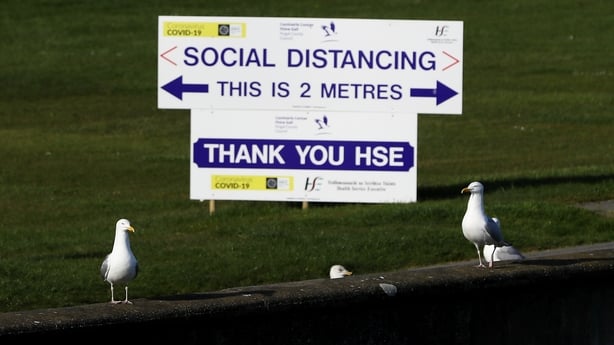
He said the decision to move to Phase Two will be made on the basis of the available medical data and the expert advice from NPHET, alongside reports from key Government departments.
NPHET met today to finalise the advice it will give to Government.
Earlier, the Dáil also heard that the Pandemic Unemployment Payment will be extended for months, not weeks.
Mr Varadkar said that nobody who was working full-time before the Covid-19 pandemic will see their payment cut, saying it will stay at €350 per week.
However, he said some of those who were working part-time will see their payment reduced.
He said their weekly payment "will still be more than they were earning" on a weekly basis before the pandemic.

